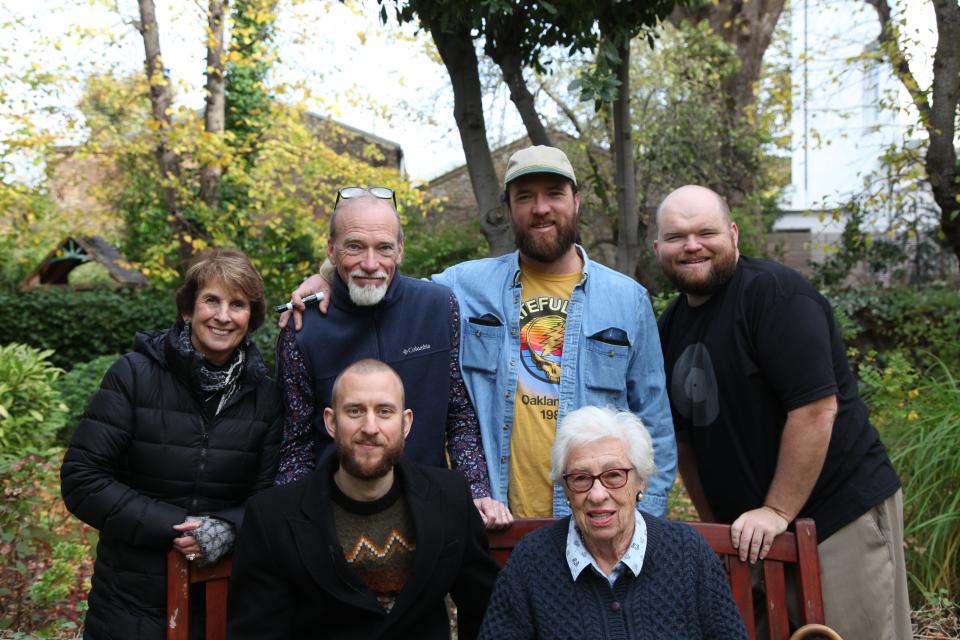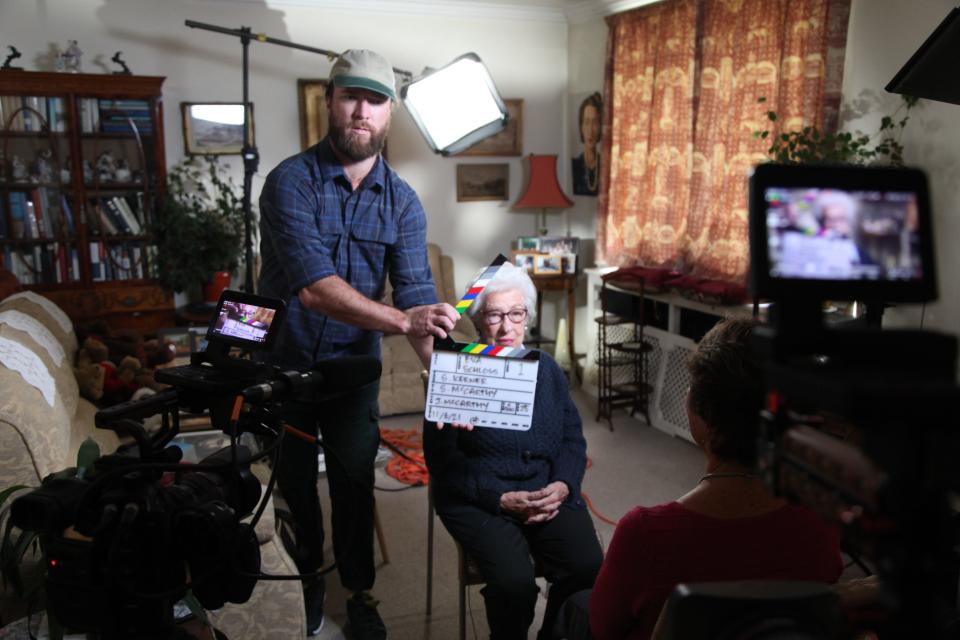Montclair professors' film about Holocaust survivor fulfills 'Eva's Promise'
- Oops!Something went wrong.Please try again later.
- Oops!Something went wrong.Please try again later.
- Oops!Something went wrong.Please try again later.
- Oops!Something went wrong.Please try again later.
Eva Schloss, the subject of "Eva’s Promise," a documentary being produced by two Montclair State University professors, kept her Holocaust survival story quiet for decades.
It took that long for her night terrors to subside, said Steve McCarthy, a professor of journalism and documentary filmmaking at MSU, who, along with Susan Kerner, emeritus professor of theater at MSU, is racing to finish the film with the help of the 93-year-old Schloss.
“When we met her she told us two things: Get it done, and hurry,” McCarthy said.
After being discovered by the Nazis in an Amsterdam hideaway during World War II, Schloss (then Geiringer) and her parents and brother Heinz were sent to Auschwitz/Birkenau; only she and her mother survived.

But on the train to the camps, Heinz made his sister promise that if he didn’t come back, she would retrieve the trove of paintings and poems he’d hidden under the floorboards of his Amsterdam hideaway.
After Schloss and her mother were liberated by the Russians, she returned to Amsterdam and discovered her brother’s artwork and poetry, now on display in an Amsterdam museum.
For 40 years she kept her story to herself, because of the horror and also out of deference to her stepfather, Otto Frank, who married her mother, Fritzi, after the war. Frank had lost his daughters and wife in the concentration camps and was consumed with sharing Anne’s diary, which, like Heinz’s paintings, had been stashed in an Amsterdam-area hiding place.
Even before the war, the Frank and Geiringer families had been friendly. They had landed in the same area of Amsterdam after fleeing the Nazis. Anne and Eva and Margot Frank and Heinz were classmates and shared a circle of friends.
Montclair connection
The film was born in Montclair because of a longstanding friendship between Schloss and Kerner. In the ‘90s, Schloss became a character in a play that toured the globe, about a boyfriend of Frank's ("And Then They Came for Me: Remembering the World of Anne Frank"), produced by Kerner.
Schloss began to speak out about her experience in the '80s, after Otto Frank died, and traveled the world as a Holocaust speaker. That's when her nightmares started to subside, Kerner said.
More recently, Schloss was part of the campaign to convince Mark Zuckerberg to ban Holocaust deniers from Facebook, and she is prominently featured in this year's Ken Burns documentary, "The U.S. and the Holocaust." At the Museum of Jewish Heritage in Manhattan, there is a hologram-like projection of Schloss, to which visitors can pose questions; an award-winning short film called "116 Cameras" documents the process of creating the lifelike image.

But Schloss had focused generally on her family's experiences during the war, not on her brother's hidden artwork and poetry.
Increasingly, the realization that her brother's story would die with her saddened her. Last year, she called Kerner to ask for her help in getting Heinz's story out in the world. Kerner immediately thought of McCarthy, an Emmy-award-winning filmmaker previously with "Dateline" and "60 Minutes." “I knew a film would reach the largest audience,” she said.
McCarthy didn’t hesitate, though the project’s time and financial pressures were daunting. “The last of the Holocaust survivors are passing away,” he said. “This was a chance to tell this important story, so we never forget. It’s kind of a mitzvah.”
In November 2021, McCarthy and Kerner, co-producers of the film, flew to Europe. With no time to raise funds, they brought McCarthy’s sons Ryan and Justin, who worked as editor and cameraman on the project’s “microbudget.” His artist daughter Alison created the film’s graphics.
For 12 hours over three days, they filmed Schloss in her London apartment. Then they traveled to Amsterdam's Dutch Resistance Museum, to which Schloss donated Heinz’s paintings and poems in 2006.
A bonus was gaining access to the house where Heinz had hidden his poetry and art. “We didn’t have a phone number, so we took the train and knocked on the door,” McCarthy said. “The people knew the story, were very warm and allowed us to film inside.”
"Eva’s Promise" is full of poignant and often heartbreaking moments. It opens with the only known footage of Anne Frank, taken by a photographer who was filming a couple leaving a nearby house on their wedding day. As Anne watches the newlyweds from her balcony, the camera pans to a young man with a bicycle who is also watching; it is Heinz Geiringer.
“Heinz had immense talents and gifts, just like Anne Frank,” Kerner says in the film. An accomplished musician, he only took up painting and poetry at age 16 when he was in hiding and couldn't play the piano or guitar. His work shows pain as well as promise. One painting, called “Time is Running Out,” depicts a book, an hourglass and a death mask.
In the movie, Schloss, originally from Austria, talks matter-of-factly in a German accent about the increasing terror in Amsterdam, the horrors of the camps and the deep bond she shared with her brother.
“What a wonderful relationship we had, how talented he was,” she says in the film. “He was going to contribute a lot to the world.”

When the women’s camp at Birkenau was liberated, Eva’s mother was near death, so 15-year-old Eva made the dangerous journey to Auschwitz to look for her brother and father by herself. There, she encountered Otto Frank, who told her that her father and brother had been taken away by the Germans several weeks before. After eventually learning they had perished, she spent years angry and depressed.
The first version of the film was completed in time for October’s Montclair FIlm Festival, where it played for three sold-out shows.
Its next showing will be in January in a small art house cinema in New Hampshire, followed by screenings at the Dutch Resistance Museum and then at a Jewish community center in London. The hope is that these showings will raise funds to make a final, expanded version to distribute to educators and politicians. That mission is critical, the producers say, to counter the voices of antisemitism and Holocaust denial rising around the globe.
There is new information and images to add to an updated version of the documentary, including film of Schloss at Ebensee, Austria, a couple of years ago. She went there for a memorial service after learning, many decades later, that her father and brother died there, in the caves where the Nazis hid their weapons, and not on the forced march from Auschwitz in Poland to Mauthausen in Austria, as she'd been told. "It shattered her all over again," Kerner said.
Eventually, the team hopes to license the documentary to a streaming channel in the U.S., a long shot with the number of films competing, McCarthy said, or show the film directly in theaters.
Both producers, however, are thrilled that their most important goal, of capturing Eva’s story on film and showing it to her, has been accomplished.
“We had to finish it for her,” McCarthy said. “Sharing Heinz’s story with the world had become her mission in life.”
This article originally appeared on NorthJersey.com: Montclair professors' film on Holocaust survivor fulfills Eva's Promise

